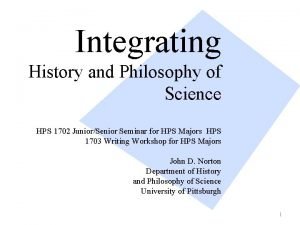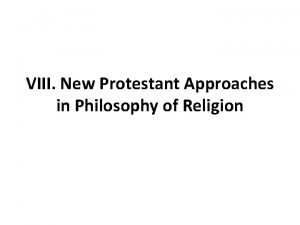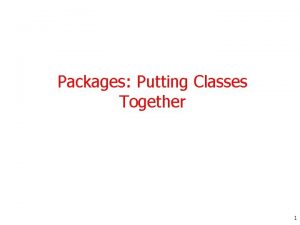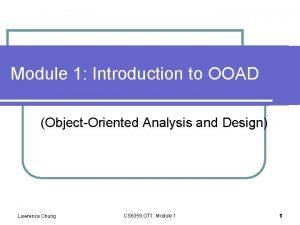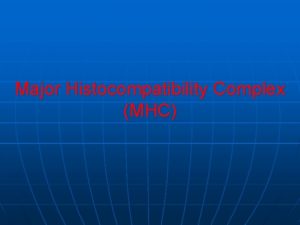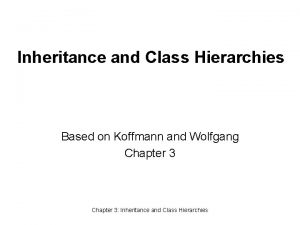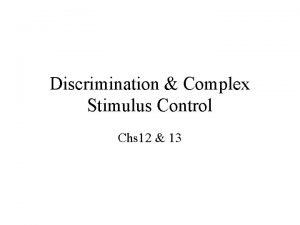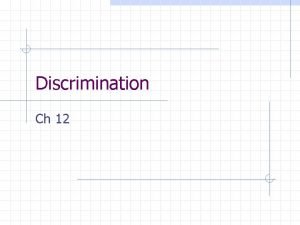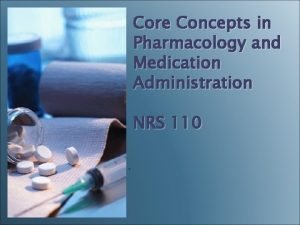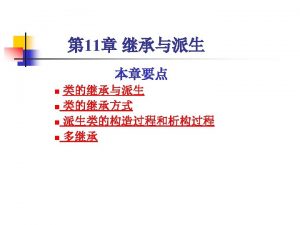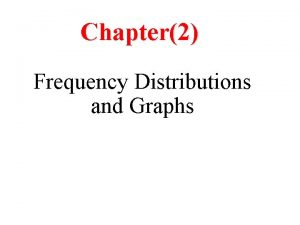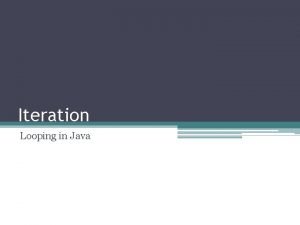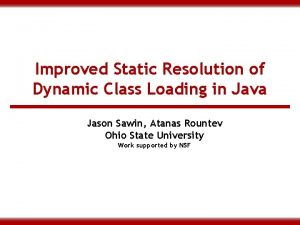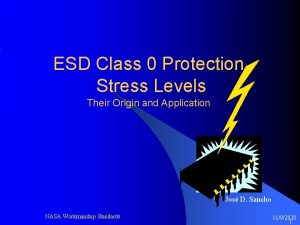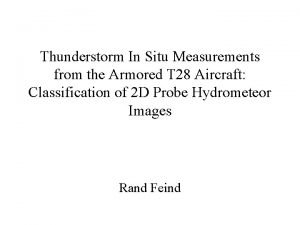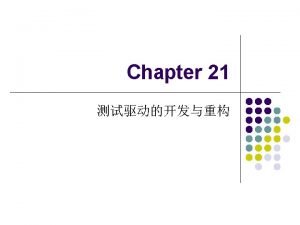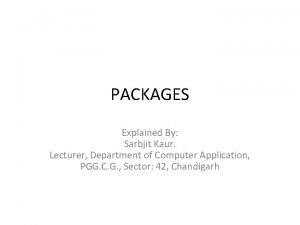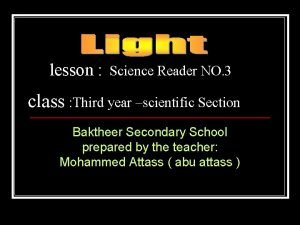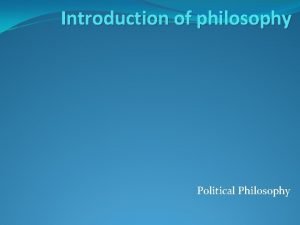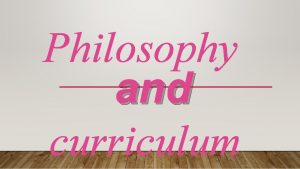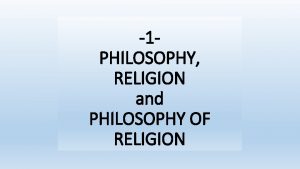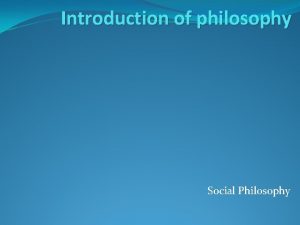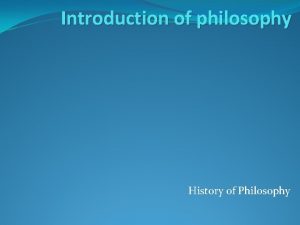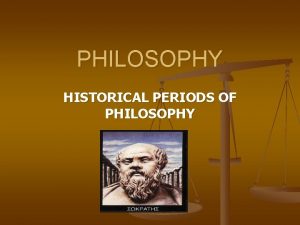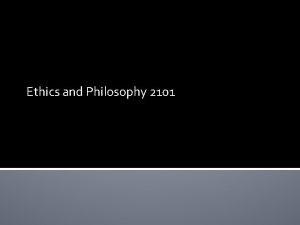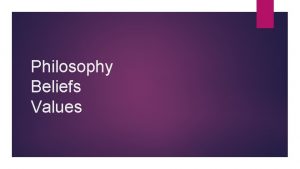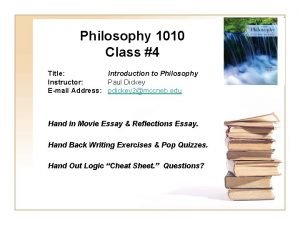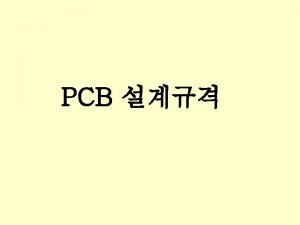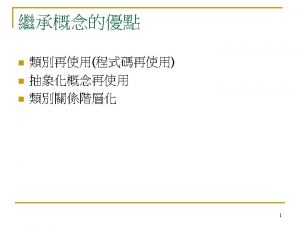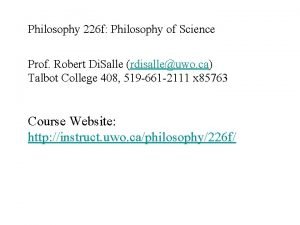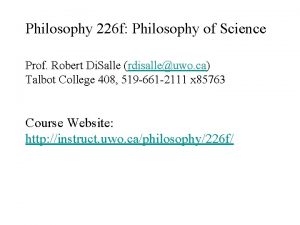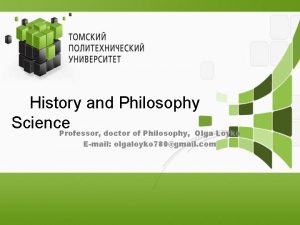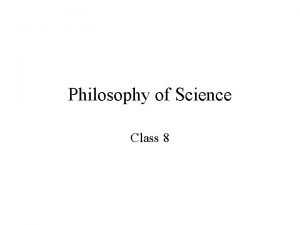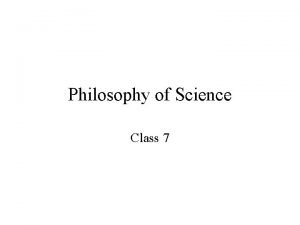Philosophy of Science Class 4 Philosophy of Science






















- Slides: 22

Philosophy of Science Class 4

Philosophy of Science Debate Rules of Play Each team member must ask at least 1 question and answer at least 1 question. Teams have 30 sec. to deliver question, 30 sec. to correct vague question. Teams have 1 minute to prepare an answer Teams have 1 minute to answer question. Scoring Rules: Teams earn 1 point for good question, ½ point for so/so question, 0 pt for poor question. Teams earn 1 point for good quality answer. ½ point for so/so answer, 0 pt for poor answer. Teams can earn 1 point by “rescuing” a poorly-answered question, or expanding on a so/so answer.

Philosophy of Science Debate Rescuing questions: If question not fully answered, other teams have opportunity to rescue. Play duration: Each member of each team must ask 1 question and answer 1 question, NOT counting “rescues”. If teams run out of questions, Kent will supply new ones. Order of asking/answering (N/A for less than 4 teams): Asker team: Team that just answered Answer team: Kent determines

Philosophy of Science Debate Grading Pts A Full credit (5 grade pts) 4 -5 Pts B 4 grade pts 6 + 3 Pts C 3 grade pts 2 Pts D 1 grade pt 0 -1 Pts F 0 grade pts

The “Trials” of Metaphysical Belief Systems Positivism a reaction to, and liberation from, religious dogma: If you can’t see it, feel it, measure it—it can’t be verified. Seeing is believing and NOT the other way around.

Modern Beliefs Unburdened by Evidence Creation of life on earth as per Genesis is fact Telepathy is real Percent Believe This 66% Ghosts exist 66% Angels and Demons are active in the world Global warming a hoax by science, news, pols Vaccines cause autism 66% Barak Obama IS the anti-Christ 25% US Govt. responsible for 9/11 attacks 25% Media insert mind-control tech into broadcasts 15% 33% 25%

Karl Popper “Received Wisdom” vs. Induction Received Wisdom: Nightmares are due to excess black bile. Cure: Bleeding. Induction critique: Where is this black bile? Show me! Bleeding works? Show me!

Induction (Direct Observation) and Major Scientific Advances Galileo Darwin Freud

Science NOT About Discovery; It’s About Verification Creation of new ideas is a problem of empirical Psychology: NOTE: This is where Popper and Kuhn might conflict. It is NOT a scientific problem. (Though it is a scientific objective). How we acquire new info. is province of psych. of knowledge. How we evaluate new info is the province of science. Science is NOT the inspiration of discovery, but “rational reconstruction” of predicted events to confirm and verify.

Induction: General statements arise from specific observations. Obs. 1: People with traumas have nightmares Obs. 2: Talking about traumas relieves nightmares General rule: Undisclosed bad events lead to psych. Problems with Induction: Where is “ground zero” for distress observation? 1. Infinite regress: a. Nightmares? Or all bad dreams? What makes a dream “bad”? What makes a dream? Are dreams real? b. Disclosure: Talking only? Or talking with feeling? What’s a feeling? What is an authentic feeling? Are emotions real? 2. Reliance on “facts”: “Observable Facts” are building blocks for induction. But humans are fallible, can

Induction Problem: Dogmas of Institutions Supplanted by Certainties of Observer GUESS WHAT I SAW!!!!! How to overcome errors of inductive certainty? INTERSUBJECTIVITY: Methods that ensure others see what you see, as you see it, on their own.

Problem of Demarcation Point (DP): Where science differentiates itself from math, philosophy, humanities in creating knowledge. DP for positivists: Sensory experience. Theory based on concepts Evolution Natural selection Concepts based on experience Natural sel. seeing adaptations Experience based on senses Adapts. Experienced sight, sound. Science for positivists: Permits as legitimate only things reducible to observations. “Metaphysics”: Concepts, beliefs that cannot be directly

Positivists’ Conundrum in Psychology Positivists believe that only observables count as science. Psych problem: How do you observe the process of observing? “Structuralists” used “introspectionists”-- a classic case of infinite regress. Edward Titchener

Experience as Method Popper poses three criteria of science: 1. Synthetic: The pieces (theories, concepts, observations) must fit together; cannot contradict each other. 2. Satisfy criterion of demarcation: Must relate to real world, not a matter of metaphysics. “Does God hear our prayers? ” and “Does life have meaning? ” are metaphysical questions. “God” cannot be observed, measured. “Does heat affect weight of metal? ” is a scientific question; all aspects can be observed and measured Intersubjectivity.

Falsifiablity as Criterion of There is no need to both verify and falsify. Sufficient to Demarcation permit falsification; do this and “verification” takes care of itself. “All swans are white” How many confirming observations satisfy this claim? How many disconfirming observations rebut this claim? Infinite regress problem? Mood = Facial expression; What is facial expression? Expression = arrangement of features. What’s a feature? . . . Popper solution: Functionalist; stop at a level where most agree definition is meaningful, it can be reliably measured,

Can You Critique Like Carl Popper? Research Question: Do diverse groups solve problems quicker than homogenous groups. Attributes of this question. Is this a good question? How was question generated? i. e. , from theory, previous learning, or just Who developed question: “intuition”? trained researchers or lay persons? How is question tested? Scientifically Relevant? IRRELEVANT

Kuhn: Scientific Revolutions Paradigm: A meta theory that permits subsidiary theories and hypotheses to emerge. Cognitive Dissonance = paradigm Problems arising from and answered by dissonance theory: Choices and preferences Moral behavior Loyalty to Group Stubbornness of beliefs Normal Science: Problem solving, figuring out puzzles created by the existing paradigm. Outcomes of studies are largely predicted by theory

Normal Science Leads to Anomalies Leads to Paradigm Shift Normal science leads to: a. Greater precision b. More sophisticated instruments and measures Precision and better instruments lead to finding ANOMALIES — Events, outcomes that don’t fit with paradigm Discovery starts with awareness of anomaly—and the discomfort that this awareness creates. Thus, contrary to Popper, Kuhn seems to suggest that discovery is integral to science, and arises naturally from

Cognitive Dissonance to Self Affirmation: Paradigm Shift Festinger: Dissonance occurs when person holds two incompatible ideas about same object at same time. Aronson: Dissonance seems to require: a. Incompatible ideas about the self. b. Experiments where self is embarrassed Steele: Dissonance doesn’t work as expected among Mormon housewives? !? Perhaps problem isn’t dissonance, but self-image. Motive for self-worth. Self Affirmation Theory: new paradigm

Psychology of Discovery: It’s in the Cards Bruner & Postman, 1949 Subjects scan cards, told to ID playing cards. Some cards are anomalous: e. g. , red ace of spades, black Jack of Hearts. Anomalies first ID’d as normal cards Black Jack of Hearts “Jack of Hearts” Maybe subjects didn’t even see error? !? Discovery preceded by feeling of “wrongness”— confusion, hesitancy. Once discovery made on initial anomaly, all other “wrong cards” quickly ID’d as such. Some subjects don’t consciously find problem, but emotionally seem to do so: Experience “acute distress”.

From Normal Science to Paradigm Shift 1. Paradigm Normal Science (to confirm and broaden paradigm, and use it to learn about world) 2. Normal Science adheres to paradigm, becomes rigid, conventional within it. 3. Normal science uses paradigm to develop more precise instruments to better confirm paradigm, and to better use it for discovery. 4. New instruments of normal science anomalies 5. First try to fit anomalies into paradigm; but more efforts more problems. Crisis emerges—old paradigm is failing, but nothing to replace it

Discovery in the Lab = Discovery on the Couch? 1. Paradigm Normal Science Basic beliefs daily living 2. Anomalies Crisis Betrayal, loss, illness Crisis 3. At first resist discordant data “Resistance” at start of therapy 4. New discovery new theory Insight new beliefs
 What's your favourite school
What's your favourite school Philosophy of science
Philosophy of science Philosophy of science
Philosophy of science Do we have class today
Do we have class today Package mypackage; class first { /* class body */ }
Package mypackage; class first { /* class body */ } Introduction to ooad
Introduction to ooad Measures of central tendency for grouped data
Measures of central tendency for grouped data Class i vs class ii mhc
Class i vs class ii mhc Abstract concrete class relationship
Abstract concrete class relationship Class width
Class width Response class vs stimulus class
Response class vs stimulus class Response class vs stimulus class
Response class vs stimulus class 7 rights of medication administration in order
7 rights of medication administration in order Class maths student student1 class student string name
Class maths student student1 class student string name What is the class width for the given class (28-33)?
What is the class width for the given class (28-33)? In greenfoot, you can cast an actor class to a world class?
In greenfoot, you can cast an actor class to a world class? Static and dynamic class loading in java
Static and dynamic class loading in java Esd class 0 vs class 1
Esd class 0 vs class 1 Aggregation vs composition
Aggregation vs composition Class 2 class 3
Class 2 class 3 Extends testcase
Extends testcase Package mypackage class first class body
Package mypackage class first class body Class third class
Class third class

